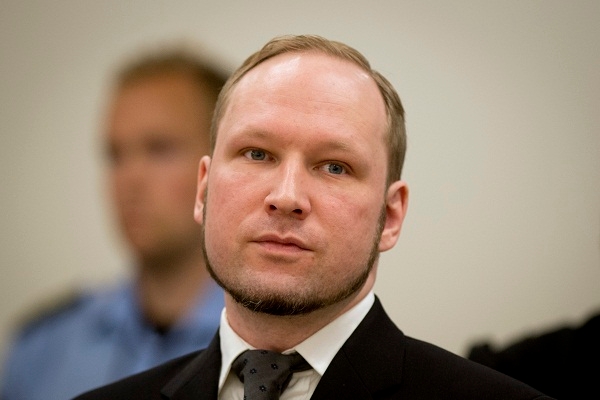It’s the last day of banned book week but perhaps we should spare a thought for banned editors. An editor at Éditions Gallimard, who worked on Jonathan Littell’s The Kindly Ones, recently published three essays (with another house). The first, an account of his amorous adventures in Amsterdam, and the second, ‘Ghostly Language’, are, according to the author, to be kept in mind when tackling the final essay ‘Antiracism as the Literary Terror’ and the appendage, his pièce de resistance, ‘The Literary Eulogy of Anders Breivik’. That, in sum, is why Richard Millet is – for all the wrong reasons – one of the most famous essayists in France right now. It is also why he was forced to resign as an editor from Gallimard’s celebrated panel, le comité de lecture, which selects books for publication.
He is undoubtedly provocative. In the magazine L’Express, he summarises his work as a discussion of the relationship between ‘the decline of literature and the deep changes wrought in France and Europe by continuous and extensive immigration from outside Europe, with its intimidating elements of militant Salafism and of the political correctness at the heart of global capitalism; that is to say, the risk of the destruction of the Europe and its cultural humanism, or Christian humanism, in the name of “humanism” in its “multicultural” version.’
The line most cited by critics was Millet’s suggestion that Norway had received its just deserts and that other countries like France and England might soon be in line:
‘In this decadence, Breivek is perhaps what Norway deserved, and what lies in wait for our societies that turn a blind eye in order to renounce more easily the values for which they stand, particularly in France and England.’
Given his belief that current writing is impaired by nihilism – an attendant of the relativism demanded by multiculturalism – one must, according to Millet, view Breivik as a ‘writer by default’. His actions, however atrocious, have a formal and aesthetic ‘perfection’. Either way his victims were ‘only young Socialists, and thus future collaborators with the forces of multicultural nihilism’. And as if to make his argument all the more convincing, Millet described his own identity crisis provoked by being the only white man in the metro as harmful to the process of writing. (Someone needs to visit “le psych”).
And the provocation worked. The French intellectual Left pounced immediately, simultaneously denouncing the ‘Pavlovian’ response of defenders of freedom of speech. The First Minister Jean-Marc Ayraut waded into the literary debate, confessing himself ‘shocked’. In the Nouvel Obs, Nobel Prize winner J.M.G. Le Clézio called the issue of multiculturalism ‘void’ and a non-issue as it was, and had always been, an integral part of France. Novelist Annie Ernaux wrote a riposte in Le Monde, followed by over a hundred signatures, although a blog in L’Express then politely, but pointedly, questioned, with the help of Wikipedia, who exactly some of those names were. Bernard Henri-Levy said something BHL-ish. And, unlike at Charlie Hebdo where windows were smashed and death threats uttered, no radical Islamists could be bothered to react.
It’s a shame that no one spoke about the ambiguity of his description of Breivick: ‘far from being a exterminating angel, or a beast of the Apocalypse, he is at once executioner and victim, symptom and the impossible cure.’ Freedom of speech, its power and the responsibility it entails, is a well-worn issue. But literature is one of the few places where one can discuss uncomfortable questions like our society’s responsibility for its products and can try to understand (and prevent) its aberrations by granting them humanity without condoning their actions. Labeling them as one-off maniacs will never solve anything.
The press’s indignation wasn’t needed in the end. In his self-pitying rebuttal, ‘Why are you killing me?’ in the L’Express, Millet revealed himself, formerly so well regarded as an editor, as a hypocrite and coward. How could he not predict that his comments might cause offence, might be taken out of its precious context using, as he put it, ‘Stalinist methods of citation’ and that some might not appreciate his ‘excessive irony’? His comment that he been brought up in Libya smacked of ‘I’m not racist, my friend’s black.’ And the comparison between his depiction of a murderer to Brett Easton Ellis’s or to Truman Capote’s managed to make it seem as if he thought Patrick Bateman was a real person. Though he compared his detractors to a lynch mob, Millet effectively tied his own noose.
However, it was Gallimard who kicked the stool from under his feet by his forced resignation. This was despite none of the authors who work with him overtly signaling their disapproval. They apparently agree with Millet’s assertion that he can draw a strict line between his own work and others. And so he should. This is where the issue of freedom of speech actually becomes interesting. The back and forth in the press showed that, despite tending towards the politically correct, most people felt free to express their opinion. However there was little comment on his expulsion from Gallimard’s comité de lecture. This is an issue. To keep authors happy, Millet is being kept on to look after his backlist; this smacks of hypocrisy. Publishing houses should encompass a variety of views, however unpalatable, and resort to balancing views rather than silencing them. Indeed, by publicly forcing him to resign, they patronise their authors and undermine the integrity and talent of their editors to do their job without personal bias.
But whether you find rehashed racism (with exquisite use of the imperfect subjunctive) a good read, or whether you’d enjoy winding up a neighbour at a dinner party on the Left Bank by calling it art, I think we can all come together and congratulate Millet for one thing. His literary eulogy lasted a mere eighteen pages; Breivick’s manifesto dragged on for fifteen hundred.






Comments